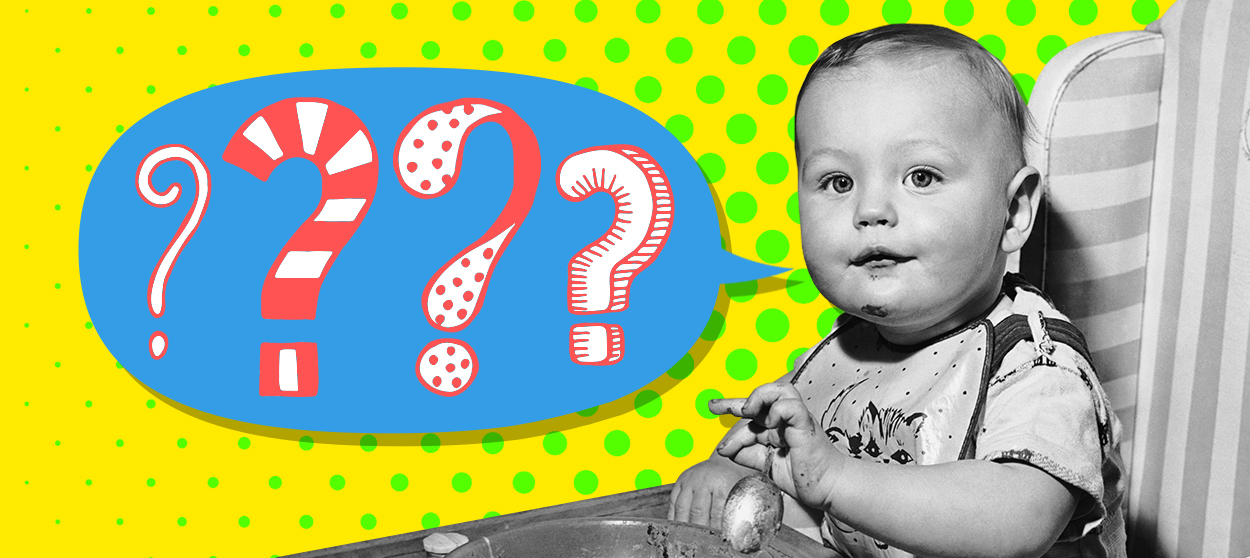Smiles, words, steps: The unrelenting myth of baby 'firsts'
Parents often think their kid's first milestones will be easy to identify. But they never are.


A free daily email with the biggest news stories of the day – and the best features from TheWeek.com
You are now subscribed
Your newsletter sign-up was successful
Before we had children, my wife and I figured it would be a relatively easy affair to pinpoint our kid's first word. One day she'd crawl up to us, tap us on the shoulder, and say with utmost clarity: "Father and mother, thank you for taking the time to meet with me. I have decided now... to speak. Yes, yes. Bask in my glory. I shall now communicate with authentic words of English rather than grunts, screams, and blowouts."
But it didn't happen that way. Instead, our first-born daughter said something close to "hi" — which I now believe is nearly every English-speaking baby's actual first word no matter what the adults say — and we didn't count it because it could have just been a randomly repeated sound and it wasn't very exciting and is hi even a proper and legitimate word to begin with?
Eventually, after a bunch of syllables that may or may not have been distinct and discrete signifiers, she said "ball" when she was pointing to a ball or thinking about a ball or looking in the general direction of something even vaguely spheroid, and that's what we reluctantly put into her baby book. It didn't make for a good story and didn't seem particularly unique, but we considered it another notch in our "parenting is never as glamorous as it seemed it would be" belt.
The Week
Escape your echo chamber. Get the facts behind the news, plus analysis from multiple perspectives.

Sign up for The Week's Free Newsletters
From our morning news briefing to a weekly Good News Newsletter, get the best of The Week delivered directly to your inbox.
From our morning news briefing to a weekly Good News Newsletter, get the best of The Week delivered directly to your inbox.
A few years later we had a son, and along with him, a new chance for a great first word: something hefty, something flamboyant, something cutting-edge. Something like "impeach" or "ethereal" or "destroy the patriarchy" or "ideate" or "core competency."
But when he followed up his older sister's "ball" with a "ball" of his own, we started to really feel cheated. That's it? Not even a token "mama" or "papa" to stroke our fragile egos? Not his sister's name, the dog's name, or a great mispronunciation of Grandma like "gummo" or something? At least with him, as opposed to his sister whose interest in spheres dipped quickly, he's all about the ball. Crying? Give that kid a ball and he's set for like six to eight minutes. Hungry at the park and we forgot to bring a snack? Say "ball" and point and he'll wander around until he finds something suitably ballish. Not sleeping at 2 a.m.? Let him hug a ball and whisper into his ears "tonight you'll dream of balls both big and small and all sizes betwixt and between."
A storm of controversy settled over our family, though, as he'd actually articulated "uh-oh" before "ball." My wife claimed it wasn't a true word, and even after I pointed to the page of the well-respected (and #resistance-leading) Merriam-Webster website showing "uh-oh" to be an "interjection," which is a part of speech, which is a type of word. But again, "uh-oh" was blurry, imprecise, and unexciting. It also seemed that he was applying it too broadly for it to be considered a true word, as he'd say it when he dropped a fork but also when the doorbell rang or the dog farted.
Ultimately, we saw it as another blurred edge in the forever out-of-focus world of parenting. I imagine that some families experience firsts in very clear ways, but for us, nothing has been that precise: words, smiles, steps, sentences, friendships, all have been nebulous and hazy. I take some solace in being able to identify the first time my daughter, as a 3-year-old, called me a "poopy buttcheek" and spat in my face — nothing unclear about that — but that's as pyrrhic as victories get.
A free daily email with the biggest news stories of the day – and the best features from TheWeek.com
A good friend tells the story of her mother visiting the baby from out of town, and as grandma was literally out the door on her way to the airport, still clinging to the hopes of seeing her year-old grandson's first steps, he trundled towards her across the room to give her a goodbye hug. A beautiful moment and a good story, but all I could think when I heard it was sure, but what about the soft-shoe and the half-steps and the hands-free cruising that totally maybe probably happened before? Not as good a story, right?
It's normal to hope for trenchant words, lithe steps, and definitive milestones. But accepting the ambiguity and subjectiveness of it all can be freeing.
I'm not planning on having a third child, but if it comes to pass, I've decided their first word will be whatever we decide it is. And it certainly won't be "ball."
Bret Turner is a first-grade teacher, father, and children's musician. He is a contributor to PBS Kids and Teaching Tolerance, he's a sourdough bread baker, and has a three-legged dog. You can find more of his writing here.
-
 How to Get to Heaven from Belfast: a ‘highly entertaining ride’
How to Get to Heaven from Belfast: a ‘highly entertaining ride’The Week Recommends Mystery-comedy from the creator of Derry Girls should be ‘your new binge-watch’
-
 The 8 best TV shows of the 1960s
The 8 best TV shows of the 1960sThe standout shows of this decade take viewers from outer space to the Wild West
-
 Microdramas are booming
Microdramas are boomingUnder the radar Scroll to watch a whole movie
